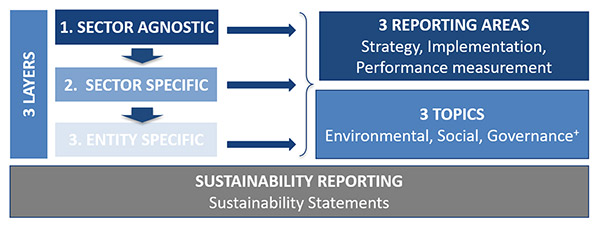Both the European Council and the
European Parliament have called on the Commission to consider the
development of European sustainability reporting standards for
corporates. The Commission has taken a number of preparatory steps to
speed up the development of European sustainability reporting standards.
One of these steps was to ask the European Financial Reporting Advisory
Group (EFRAG) to explore what these standards might look like and to
propose a roadmap for their development. A dedicated multi-stakeholder task force chaired by Patrick de Cambourg, President of the French Accounting Standard Setter (Autorité des normes comptables)
was set up for this purpose. The Commission also asked Jean-Paul
Gauzès, the President of EFRAG and ex-MEP, to make recommendations for
possible changes to the governance of EFRAG in the event that it were to
be entrusted with the task of developing these standards. EFRAG
published both reports on 8 March 2021. The Commission, which is
preparing the revision of the Non-Financial Reporting Directive, is
considering the recommendations when finalising its proposal, which it
plans to publish in April 2021.
Sustainability reporting
Standardised,
comparable, reliable and relevant sustainability information provided
by companies constitutes the foundation of the sustainable finance
ecosystem. Banks, insurance companies and asset managers need this
information to manage their own exposure to sustainability-related risks
and to manage the impacts of their investment and lending portfolios on
society and the environment. NGOs and other civil society organisations
need this information to monitor and hold companies accountable for the
impact their business has on the outside world. Common sustainability
reporting standards would be a major improvement on the current
corporate reporting framework. They would mark a key step towards
putting sustainability reporting and financial reporting on an equal
footing.
The report from Jean-Paul Gauzès proposes how to deal
with the challenge of creating a rigorous and inclusive process for the
development of sustainability reporting standards. It sets out how
national and European authorities could be involved, while ensuring that
the process also draws upon the expertise of the private sector and
civil society organisations. The report proposes the creation of an
additional element – or ‘second pillar’ – within EFRAG, dedicated to
work on the sustainability reporting standards. This would leave the
existing financial reporting pillar of EFRAG largely unchanged. The
proposed governance structure would also ensure the coordination and
interconnectivity between the two pillars, given the growing interaction
between financial and sustainability reporting.
Standard setting
The
report from the multi-stakeholder task force chaired by Patrick de
Cambourg, proposes a roadmap for the development of a comprehensive and
dynamic set of EU sustainability reporting standards. It highlights a
number of important building blocks, including:
- Standard-setting
for sustainability reporting should reflect the needs of EU policies
and legislation, including key components of the sustainable finance
agenda such as the Taxonomy Regulation and the Sustainable Finance
Disclosure Regulation
- The standard-setter should adopt a
proportionate approach to SMEs by balancing (i) the specific governance,
organisation and resources of SMEs and (ii) the need for sustainability
information produced by SMEs to be relevant for their stakeholders
(value chain and financial institutions in particular)
- The
standard-setter should consider intangibles as a key dimension of
sustainable business development and therefore of sustainability
reporting
The report stresses the need to adequately
connect financial and sustainability reporting, and for standards to
cover not just backward-looking information about past performance, but
also forward-looking information. It explores in detail the practical
implications for the standard-setter and for companies of the so-called
double materiality perspective: the idea that companies should report on
the sustainability-related risk to which they are exposed, as well as
on their own impacts on people and the environment.
Future standards
The
report from the multi-stakeholder task force chaired by Patrick de
Cambourg recommends three layers of reporting: “sector-agnostic”
(disclosures that all companies have to make regardless of their
sector), “sector-specific” (disclosures that reflect the particular
risks and impacts of a given sector), and “entity-specific” (disclosures
that a company may make about issues relevant to its own particular
circumstances). The standards would cover the complete range of
sustainable issues under the well-established structure of
environmental, social and governance (ESG). And they would cover three
broad reporting areas: the company’s strategy, its implementation, and
performance measurement.
 Standards Target architecture
Standards Target architecture
Financial
standard-setting has taken decades to reach maturity, but we do not
have that luxury in the case of sustainability reporting standards. The
report proposes therefore to begin the process by establishing a first
set of standards covering core information for the three sustainability
topics (ESG) and the three reporting areas. The content of those
standards would then be enhanced in a second phase and on an on-going
basis.
The international dimension
Both
reports stress that standard setting should build upon and contribute
to international initiatives that have similar goals, and this
cooperation should be carried out in a spirit of partnership and
‘co-construction’. The report from Jean-Paul Gauzès proposes a
structured dialogue between EU and global standard-setting initiatives,
and raises the idea of joint projects to develop new standards where
that might be appropriate. It also proposes the establishment of a
Consultative Forum through which EFRAG would coordinate with
international and national standard-setting bodies.
These reports
represent an important voice in the discussions about how best to
develop European corporate sustainability reporting. Their
recommendations are being considered by the Commission when finalising
the proposal for the revision of the Non-Financial Reporting Directive
(NFRD). The revision of the NFRD is a crucial element for strengthening
the foundations for sustainable investment, the importance of which was
stressed in the sustainable finance action plan.
Read more on the reports:
https://ec.europa.eu/commission/presscorner/detail/en/mex_21_1062
https://ec.europa.eu/info/publications/210308-efrag-reports_en